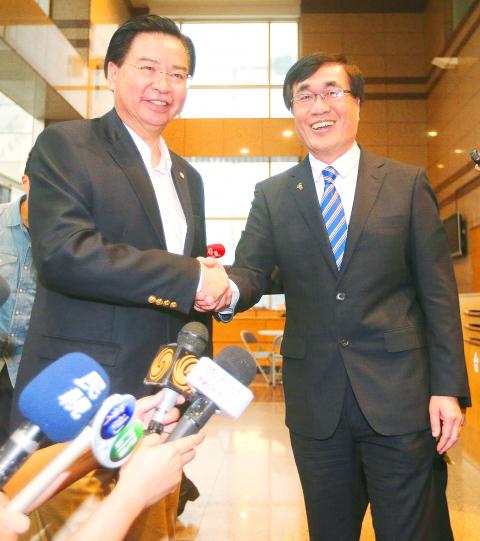The Chinese Nationalist Party (KMT) yesterday rejected an invitation by the Democratic Progressive Party (DPP) to jointly hold a national affairs conference on constitutional reform with other political parties and civic groups, DPP spokesperson Cheng Yun-peng (鄭運鵬) said.
DPP Secretary-General Joseph Wu (吳釗燮) proposed to KMT Secretary-General Lee Shu-chuan (李四川) that all the major political parties and civic groups co-host a national affairs conference to seek consensus on constitutional reform, Cheng said.
Wu was told that the KMT favored the issue being discussed by the legislature’s Constitutional Amendment Committee instead of at a national affairs conference, Cheng said.

Photo: CNA
The DPP will continue to communicate with the KMT about the idea, which is supported by the Taiwan Solidarity Union, the People First Party and civic groups, he said.
“Since issues related to reform to the legislative electoral system are among those put up for discussion regarding constitutional reform, what could be expected from an amendment drafted by the legislature alone?” Cheng said.
KMT spokesperson Lin Yi-hua (林奕華) said that the party does not oppose a national affairs conference, but said that such a conference should be presided over by President Ma Ying-jeou (馬英九), as previous conferences were by former presidents Lee Teng-hui (李登輝) and Chen Shui-bian (陳水扁) when they were in office, and that issues such as cross-strait relations and housing justice should also be on the agenda.
Wu and Lee met for an hour at KMT headquarters in Taipei.
The KMT had expected to discuss constitutional reform with the DPP at the Lee-Wu meeting, but the talks between Lee and Wu did not go beyond the proposed national affairs conference, Lin said.

A Ministry of Foreign Affairs official yesterday said that a delegation that visited China for an APEC meeting did not receive any kind of treatment that downgraded Taiwan’s sovereignty. Department of International Organizations Director-General Jonathan Sun (孫儉元) said that he and a group of ministry officials visited Shenzhen, China, to attend the APEC Informal Senior Officials’ Meeting last month. The trip went “smoothly and safely” for all Taiwanese delegates, as the Chinese side arranged the trip in accordance with long-standing practices, Sun said at the ministry’s weekly briefing. The Taiwanese group did not encounter any political suppression, he said. Sun made the remarks when

The Taiwanese passport ranked 33rd in a global listing of passports by convenience this month, rising three places from last month’s ranking, but matching its position in January last year. The Henley Passport Index, an international ranking of passports by the number of designations its holder can travel to without a visa, showed that the Taiwan passport enables holders to travel to 139 countries and territories without a visa. Singapore’s passport was ranked the most powerful with visa-free access to 192 destinations out of 227, according to the index published on Tuesday by UK-based migration investment consultancy firm Henley and Partners. Japan’s and

BROAD AGREEMENT: The two are nearing a trade deal to reduce Taiwan’s tariff to 15% and a commitment for TSMC to build five more fabs, a ‘New York Times’ report said Taiwan and the US have reached a broad consensus on a trade deal, the Executive Yuan’s Office of Trade Negotiations said yesterday, after a report said that Washington is set to reduce Taiwan’s tariff rate to 15 percent. The New York Times on Monday reported that the two nations are nearing a trade deal to reduce Taiwan’s tariff rate to 15 percent and commit Taiwan Semiconductor Manufacturing Co (TSMC, 台積電) to building at least five more facilities in the US. “The agreement, which has been under negotiation for months, is being legally scrubbed and could be announced this month,” the paper said,

MIXED SOURCING: While Taiwan is expanding domestic production, it also sources munitions overseas, as some, like M855 rounds, are cheaper than locally made ones Taiwan and the US plan to jointly produce 155mm artillery shells, as the munition is in high demand due to the Ukraine-Russia war and should be useful in Taiwan’s self-defense, Armaments Bureau Director-General Lieutenant General Lin Wen-hsiang (林文祥) told lawmakers in Taipei yesterday. Lin was responding to questions about Taiwan’s partnership with allies in producing munitions at a meeting of the legislature’s Foreign Affairs and National Defense Committee. Given the intense demand for 155mm artillery shells in Ukraine’s defense against the Russian invasion, and in light of Taiwan’s own defensive needs, Taipei and Washington plan to jointly produce 155mm shells, said Lin,